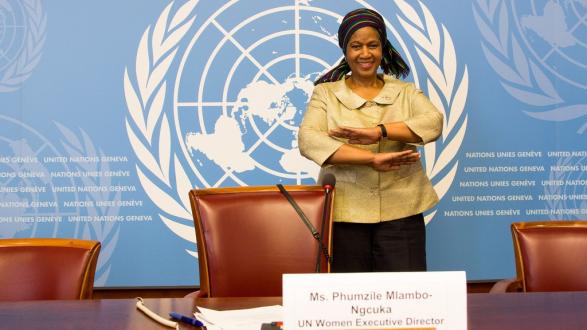In:
In the early stages of my career, I did not have enough women role models. I have found the foreign policy field especially lacking for women in top ranks of leadership and key positions to influence policy. For me it is the leadership practices of women, rather than the simple fact that they are female, that makes the difference.
Studies have found differences in the way men and women lead and approach positions of leadership. Both genders have their pluses and minuses, though the stereotypical model of an effective leader favors masculine qualities such as strength and a laser focus on results. As I climbed the ladder in my policy career, I was mindful of trying not to manage like a man and being true to myself. But I did observe postures and speaking styles and mirrored certain surface traits when attending meetings where I often found myself to be the only woman influencer in the room.
There were leadership skills I learned from working with Warren Christopher - an early supporter and longtime co-chair of the Pacific Council Board of Directors. He reserved his response or observations for the end of any group discussion. When asked to give his view before he had signaled he would offer one, he would say that he was still listening and readying his response. Leaders like this are careful to prepare what they feel worthy to share, adding a caliber of insight beyond the current group discussion. By this, Warren Christopher stood out to me as an effective leader.
Policy issues that have people, planet, and sustainability at the center may benefit if women play a key role in them.
Coming back to the difference in leadership styles between men and women, there is an opportunity to explore the science behind mind and brain functioning and what different approaches could mean for leadership in foreign policy and society. Policy issues that have people, planet, and sustainability at the center may benefit if women play a key role in them.
Why do I say this?
Research out of Penn Medicine in 2013 shows men have greater neural pathways from the front and back within a hemisphere. By contrast women's brain wiring goes from left to right between hemispheres. This hard wiring suggests tendencies for male brains to be adept at perception and coordinated action. Female brains connect analysis with intuition, meaning they look at the big picture and contextual information. Males, on the other hand, prioritize action in the short-term moment with the information at hand.
If this is true, then you may conclude, like I do, that women are well-suited to see and operate within a wider, big-picture setting. Brain science research and management literature suggest that over-the-horizon, complex issues with long-term implications may be more engaging for women and might play to their strengths as leaders. Issues like resource scarcity, environmental sustainability, and the building of today's education system for tomorrow's societal outcomes all require this wider perspective.
Without diverse thought, no group can generate the best ideas from which to choose.
This leadership style also involves an understanding of all stakeholder interests, positioning them accordingly and building alliances, cooperation, and consensus. These kinds of coalition-building and inclusive traits are valuable in our increasingly networked world. This is not to say that only women are capable of thinking and leading this way, nor is it the only effective or appropriate way to lead. Don't we want all angles represented? The world needs balance of both kinds of thinking; it is dangerous and incomplete to work with just one.
But in reality, less than one in five seats in the United States Congress belong to women and 21 percent of America's corporate C-suite are women. Furthermore, the gender breakdown for women holding policy-related positions relative to the full workforce at key D.C. think tanks shows a similar paltry proportion. Therefore, it is fair to say that the leadership qualities naturally attributed to women are not dominating our influential political or business realms. Without diverse thought, no group can generate the best ideas from which to choose.
People will thrive where they are celebrated, not simply tolerated. Our work is cut out for us in the policy sector to invest in ways to make this a field where women will thrive and rise to the top rather than survive through it.
_______________________
Jennifer A. Faust is the executive director of the Pacific Council on International Policy.




